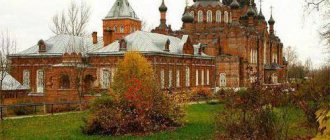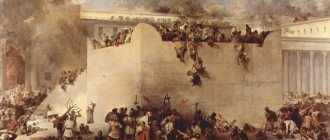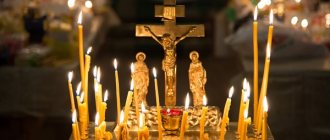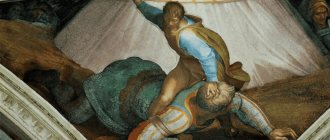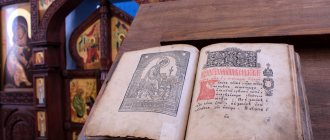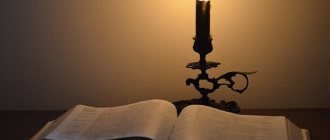Historical content
When you open the Bible, it is always worth remembering that it was written over many centuries. Each book that makes up the Holy Scriptures was born under certain circumstances, in completely different realities. It was also intended for a different range of readers.
If everything is more or less normal with the understanding of the New Testament, then with the books of the Old Testament it is not so easy for the modern reader. Texts contain a huge layer of information that not everyone can understand and comprehend without difficulty.
What does it help with?
The prayer “May God rise again” is read to drive out the devil and protect himself from the intrigues he perpetrates. The psalm is addressed for the following problems:
- the machinations of enemies prevent things from getting better;
- overcome by fear or nightmares;
- there are causeless quarrels with loved ones;
- those around them blaspheme and behave inappropriately.
Psalm 67 also helps to overcome alcohol, drug or other addiction. The power of sacred words is so powerful that it dispels darkness, driving Satan back to his halls.
The prayer “May God rise again” is read to drive out the devil
Text of Psalm 67 in Russian
1 To the director of the choir. David's Psalm. Song.
2 God will arise: His enemies will be scattered, and those who hate Him will flee from His presence.
3 Thou shalt scatter them as smoke is scattered; as wax melts before fire, so the wicked will perish at the presence of God.
4 But the righteous will rejoice, they will leap before God, and they will triumph with joy.
5 Sing to God, jingle his name, make the way of him who walks in the wilderness; his name is Jag; leap ye before him.
6 God is the Father of the fatherless and the Judge of widows in His holy habitation.
7 God gives families to the lonely, He brings out prisoners to rich places, and the disobedient live in hot places.
8 God! when You preceded Your people, when You walked in the wilderness, (Sela.)
9 The earth shook and the heavens melted at the presence of God, and this Sinai at the presence of God, the God of Israel.
10 Thou didst shed good rain, O God, and when Thy inheritance failed, Thou didst strengthen it.
11 Your flock dwelt there; according to Your goodness, O God, You prepared food for the poor.
12 The Lord gives the word: there are a great multitude of heralds.
13 Kings of armies flee and flee, but she who sits at home divides the spoil.
14 Having calmed down within your boundaries, you are like a dove, whose wings are covered with silver and whose feathers shine with gold.
15 When the Almighty scattered kings on this land, it shone like the snow on Selmon.
16 Mount Bashan, the mountain of God; Mount Vasan, a hilly mountain.
17 Why do you look enviously, you hilly mountains? This is the mountain on which God was pleased to dwell, and on which the Lord will live forever!
18 Dark chariots of God, thousands of thousands. Among them is the Lord, Sinai in the sanctuary.
19 You ascended on high, brought captives, accepted gifts for people, even for those who opposed it, so that You might dwell here, O Lord God!
20 Blessed be the Lord every day! Whether anyone burdens us, God saves us. (Sela.)
21 This God is our God the Savior, in the power of Jehovah the Lord is the gate of death.
22 God crushes the head of His enemies, the hairy crown of the one who is stubborn in his iniquities.
23 The Lord said, I will bring you from Bashan, I will bring you from the depths of the sea,
24 So that you may immerse your foot in the blood of your enemies, and let the tongue of your dogs lick it.
25 We have seen Your procession, O God, the sacred procession of my God, my King.
26 The singers walked ahead, followed by those playing musical instruments among the maidens with timbrels:
27 “In the congregation, bless the Lord God, you who come from the fountain of Israel!”
28 There is the younger Benjamin, their ruler; the princes of Judah, their porphyry-bearers; the princes of Zebulun, the princes of Nephalim.
29 Your God has given you strength. Confirm, O God, what You have done for us!
30 In Your temple in Jerusalem, kings will offer You gifts.
31 Tame the beast that dwells in the reeds, the herd of oxen and the bulls of the nations, so that they may fall down before You with the bars of silver; scatter the nations who desire battle.
32 The nobles will come from Egypt, Ethiopia will stretch out her hands to God.
33 Kingdoms of the earth, sing to God, jingle to the Lord, (Sela.)
34 To him who sits in the heavens of the heavens of all ages. Behold, He thunders with a strong voice.
35 Give glory to God; His greatness is over Israel and His power is in the clouds.
36 You are wondrous, O God, in Your sanctuary! The God of Israel gives strength and strength to the people, Blessed be God!
Holy Gospel Talisman Healer
In times after the apostles, those who received the blessing to treat and heal people in the name of Jesus Christ and the grace of heaven carried with them in the form of scrolls the words spoken by Christ, His blessing and the transmission of holy power. Among the holy healers there were those who carried special words from the Gospels, which, if carried with diligence and holiness, bestow the heavenly blessing of Christ to help people and heal.
To make a Gospel Talisman for the blessing and strength of a healer, you must write the following words from the Gospel of Luke on a blank sheet of paper on Sunday:
"Having called the twelve,
gave power and authority over all demons
and to heal diseases, and sent them to preach the Kingdom of God
and heal the sick.”
Also after these words add the words:
“Lord, confirm the anointing you have given us,
for miracles of healing and help in all needs.
In the name of the Father and the Son and the Holy Spirit.
Amen."
On the reverse side of the sheet they write the names of the 12 apostles of Christ. Fold this piece of paper and put it in your amulet. Psalm 67 or otherwise called the Psalm of the Prophecy of Christ is read over it 7 times. Now you have a powerful talisman that gives you strength and grace to heal and help people. Keep it clean and your word power will be strong.
The magic of the Holy Letter is always strong!
Why read Psalm 67?
Work as a courier at Yandex.Eda (up to 3,400 rubles per shift) leave a request →
There is a conditional division of the Psalter made by the saints - they offer several life situations and numbers of various psalms that must be read. For example, Psalm 67 is recommended for difficult childbirth (one of the holy fathers recommends reading it for this purpose). The Jews already acted in a similar way, because the book is part of the Torah.
But how justified is such an application? The Word of God is universal. Any text from the Bible, read carefully, can bring spiritual benefit. The only thing to be wary of is the magical attitude towards this action. To avoid it, you need to make reciting holy texts a regular activity for yourself. It does not matter in what language they are read - Russian or church.
Psalm 90 40 times. Creates a field of the strongest protection!
Psalm 90 40 times. Creates a field of the strongest protection!
From ancient times to the present day, believers know the 90th Psalm by heart. They read it in difficult situations and sometimes wear belts, amulet, pieces of fabric or leather with the text of this psalm.
I myself was one of the first to learn it when I came to a living faith and I use it every day in my prayer rule to protect myself, first of all, from negative thoughts, since I perfectly understand where they come from and how sinful feelings and actions can be born after thoughts.
I recommend that you also use this powerful instrument of our salvation and protection, thereby strengthening your faith in the power and love of our almighty God.
I am posting a video here where Psalm 90 is read 40 times, which creates a field of the strongest protection. How and where to use it, what is important to understand and consider
Interpretation
Psalm 67 is about how the Jews carried the Ark to their holy city of Jerusalem. At the same time, they mention all the good things that God has given them.
- Victory over numerous enemies.
- The granting of the land promised to Abraham (Palestine).
- Moses making a treaty with the Lord.
The verses glorify one successful military campaign, which brought glory and rich booty to the Jews. Many, when trying to find an interpretation of Psalm 67 for the first time, initially find themselves at a dead end. After all, it is very rich in images, including theologians who find here veiled predictions of the Savior’s sacrifice on the cross.
The text can be divided into several main parts:
- Praise the Lord.
- Description of how the Ark is carried through the desert.
- Entering enemy land and conquering it.
- David conquers Jerusalem.
- Praise to God, who gave victory to his people.
- Transfer of the shrine to the Jerusalem sanctuary.
- Prophetic verses about the future final triumph of good over evil.
Some interesting details are completely lost in translation. For example, here David mentions seven different names of the Creator - Elohim, Adonai, Lord, Lord Elohim, El Shaddai, Jehovah, Lord.
Psalter – collection of songs
Not everyone remembers this, but the psalms are not least hymns for liturgical performance. Even in the texts of many psalms there is a direct indication that they should be used specifically for the liturgy. On individual psalms there are specific inscriptions for days of the week or holidays.
However, the music that accompanied the performance of psalms in ancient times was previously lost irretrievably. In addition, the inscriptions to the psalms that relate to music are very difficult to interpret. This happened to such an extent because the apogee of the development of musical art occurred during the period of the first Temple. When this Temple was destroyed, reggae never returned to its previous level, just as some musical instruments were not used. When the ancient version of the Bible was created, even the very meaning of these musical instruments was unknown to the translators.
Musical instruments are also mentioned in the psalms themselves. Every now and then it happens that many psalms are sung to the tune of secular songs. People who are present at divine services not for the first time immediately notice this.
About daily reading of the Six Psalms
It is recommended to read the Six Psalms daily, that is, Psalms 3, 37, 62, 87, 102, 142.
Six Psalms (Exapsalms)
Six Psalms
- These are six psalms that are read at the beginning of Matins.
The Six Psalms begins with a doxology: Glory to God in the highest,
and a prayer:
Lord, open my lips.
During the sixth psalm and at the end of it, the Holy Trinity is glorified with threefold
alleluia.
The psalms that make up the sixth psalm are so touching, their content is so close to us (they depict, on the one hand, the greatness of God and the abundance of His benefits to man, on the other, the insignificance and sinfulness of man), that the Holy Church pays special attention to our for this reading. The charter says that during this reading “no one has the power to create whispers, even spit or spit; but more than anything, listen to the words spoken by the psalmist, with his hands bent towards his chest, his heads bowed, and his eyes down (lowered to the ground), with his heart eyes looking towards the east, praying for our sins, remembering death, and future torment, and eternal life.”
To arouse greater attention in the worshipers, when reading the shestop-salmiya, the charter commands to extinguish the candles and remain in the light of the lamps.
Psalm 3
This psalm is the first of the so-called six psalms, which is part of Matins, and its purpose is to give thanks to God for preserving life during the past night with a prayer for the sending of prosperity in the coming day, with which this psalm is in agreement (I go to bed, I sleep, I get up... Arise, Lord! Save me
…)
Psalm 37
This psalm occupies second place in the six psalms. Through the words of this psalm, each believer brings repentance before God of his sinfulness with a confession of complete submission in devotion to His will (v. 16). The man here expresses a desire in the coming day to make amends for the evil deeds he has done (v. 19).
Psalm 62
Psalm 62 occupies third place in the sixth psalm, composing a prayer to God at the coming of the day so that it (the prayer) will be pleasing to God (v. 6
) and that the Lord would accept the one praying under “the shadow of His wings” (v.
8
) throughout the coming day.
Psalm 87
This is the fourth psalm in the sixth psalm. The darkness of the night resembles hell, sleep resembles death. The purpose of this psalm in the morning service: before the onset of the day, the Church reminds a person of the need for effort on his part to avoid rejection from God, which is possible only with the help of God and prayer to Him (vv. 5, 14), so as not to be subjected to eternal night, eternal death.
Psalm 102
The fifth psalm in the sixth psalm shows an image of God’s merciful attitude towards man and is distinguished by its extraordinary touchingness.
Psalm 142
This psalm is the last in the sixth psalm. Having strengthened a person in the hope of receiving salvation (Ps. 102), the Church, on behalf of the believers, prays to God to show him the path of action (v. 8
), teach him to do His will and make him worthy
of the land of righteousness
(v.
10
).
God in the Psalms
According to the Psalter, God is the Creator of everything that exists on earth, the creator of the visible and the invisible. Alcohol is the one who listens, forgives, gets angry, loves, repents, regrets and vigilantly watches over his creation. Any judgment of his is objectivity itself, truth, mercy, not according to merit, but according to grace. God punishes subsequent sins, but forgives a sincerely repentant sinner. According to the Psalter, the Creator is always close to man and the people, He always knows all thoughts, there is no way to hide from Him, since He is omnipresent.
The strength of God occupies a special place in the psalms. It is mysterious, frightening, all-encompassing, and to this day people have an almost superstitious fear of it. She is God's essence. Moreover, God sanctifies everything that he chooses. This God's strength demands the same from people, obliges them to move away from sin.
All psalms and prayers are built on faith in the holiness of God. This is especially evident in psalms with messianic themes. According to the opinions of various researchers, there are 7 such psalms, 9 or 9 or 20. These numbers vary due to the fact that the psalms, in the area of essence, are united and complement each other, and the ways of presenting the messianic theme have merit.
The psalms also symbolically describe the suffering of the Lord on the cross and His removal by the Israelites.
History of writing
The second psalm is considered messianic, that is, containing prophecies about Christ. In the Hebrew, Greek and Latin Bibles this psalm is not spelled with the name of David, but in the Slavic tradition it exists. However, in the book of the Acts of the Apostles, Peter quotes the psalm in response to the persecution of Christian believers by priests ruled by Herod and Pontius Pilate. At the same time, the Apostle Peter noted that this is what the servant of God, Father David, says.
Building on the promise of Psalm 2, Peter talks about the protection of Jesus Christ for those who have strong faith. Scholars imply that the writing of this psalm dates back to the time when God's ark had already been transported to Zion.
In the first verses of Psalm 2
From verses 1 to 4, David, fighting in endless wars, knows that the Lord is next to him, calls all wars against the Almighty senseless. They will provoke the wrath and laughter of the Lord. That is, all attempts to overthrow the Lord’s Anointed will end in their desecration and ridicule. No one managed to overthrow David, who enlisted the support of the Lord himself.
Verse 7 tells us that the Lord God begat His Son. King David considers himself one. Also in the verse we find lines that the Messiah was originally with God, from the very creation of the world.
Verses 8-9 contain a powerful promise from the Creator. Christians can ask him for everything, most importantly for good and with pure faith. All enemies and problems will be destroyed by the rod and will disappear like fragments of an earthen vessel.
The Lord gives King David the right to rule the earth, holding an iron rod in his hands, and all his enemies will become like clay vessels that he can easily defeat.
Verses 10-11 are an appeal to kings in authority. They serve the Creator with fear and trembling.
